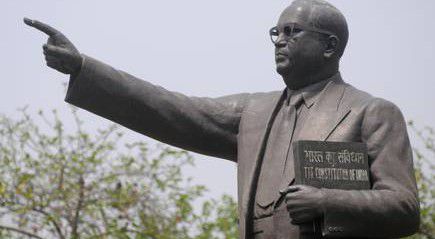Babasaheb Bhim Rao Ambedkar
The >129th birth anniversary of Dr. B.R. Ambedkar is an apt occasion to assess and reassess his thoughts and ideology and their relevance in India and the world today. Ambedkar was a philosopher who not only interpreted the society and the world during his time but also struggled to change them, fighting as a foot soldier. Having a universal vision, he shaped and steered struggles in which was forged his belief in secularism, social justice and socialism. He believed that the annihilation of caste and negation of capitalism are imperatives for change and taking India and the world forward. He declared that the bourgeoisie (capitalism) and Brahminism are the twin enemies of the people.Ambedkar also analysed nationalism in the context of the demand of the Indian commercial community/class that sought to replace Europeans in the field of trade and commerce. They wanted to do so using the trope of nationalism. They also wanted lower exchange rates and higher profits in foreign trade by taking recourse to nationalism. Ambedkar critically observed such profit-seeking orientation of the commercial class and disapproved of their predatory economic pursuits under the garb of nationalism. The very same class compromised with the British colonial Raj and served its interest. Right-wing forces such as >Rashtriya Swayamsevak Sangh (RSS) did the same. In 21st century India where the architecture of the economy is dominated by corporate and finance capital in alliance with the political formations championing the cause of so-called nationalism, it is extremely critical to recall the analysis of Ambedkar indicting the sole profit-making pursuits at the cost of people’s interests.In the present context, nationalism is being invoked in a coercive manner spreading fear and terror among people. Ambedkar, the principal architect of our Constitution, in his numerous writings reflected on nationalism and gave valuable insights. He argued very >passionately for adequate representation of the untouchables in the legislature, executive and public service. Nationalism was used as a cover to negate such demands. In fact, he categorically wrote that nationalism became the core plank to take a stand against the struggling humanity within the country and thereby creating fertile conditions for the upsurge of rank communalism. Indeed, what he wrote before Independence has become a grim reality today. The communal fascist forces have not only secured state power at the Centre but also control and command the state apparatus and their functions at the national level to serve their sinister design.It is instructive to note that Ambedkar very persuasively, prophetically and incisively wrote that the governing class in India always raised the cry of ‘nationalism/Bharat mata is in danger’ whenever the exploited classes demanded justice and fair and equal treatment and affirmative action for representation in the legislature, executive and public service. He also pointed out that the governing class was aware that class ideology, class interests, class issues and class conflicts would spell disaster for its rule and therefore always sidetracked the issues and interests of the exploited masses by playing upon the sentiment of nationalism and national unity. He described it as a misuse of nationalism. It is tragic that what Ambedkar wrote much before our Independence is now becoming a grim reality in contemporary India. Under the present dispensation at the Centre and several States, ‘ >Make in India’ is witnessing concentration of wealth in a few hands, growing inequality, galloping unemployment, farmers’ suicides and widespread disenchantment of the youth and all sections of the toiling people.
It is well known that during the freedom struggle untouchables demanded separate electorates. Such a demand was described as anti-national in spirit. Ambedkar rejected the description by stating that separate electorates for Muslims, Sikhs and Christians did not make them >anti-nationals. Then he insightfully commented, “Obviously, nationalism and anti-nationalism have nothing to do with the electoral system. They are the results of the extra-electoral forces.” In 21st century India, it is the extra-electoral forces represented by the RSS and other extremist forces that have ‘dedicated experts’ on history, culture and sociology trying to define nation and nationhood.
It is well known that during the freedom struggle untouchables demanded separate electorates. Such a demand was described as anti-national in spirit. Ambedkar rejected the description by stating that separate electorates for Muslims, Sikhs and Christians did not make them >anti-nationals. Then he insightfully commented, “Obviously, nationalism and anti-nationalism have nothing to do with the electoral system. They are the results of the extra-electoral forces.” In 21st century India, it is the extra-electoral forces represented by the RSS and other extremist forces that have ‘dedicated experts’ on history, culture and sociology trying to define nation and nationhood.




